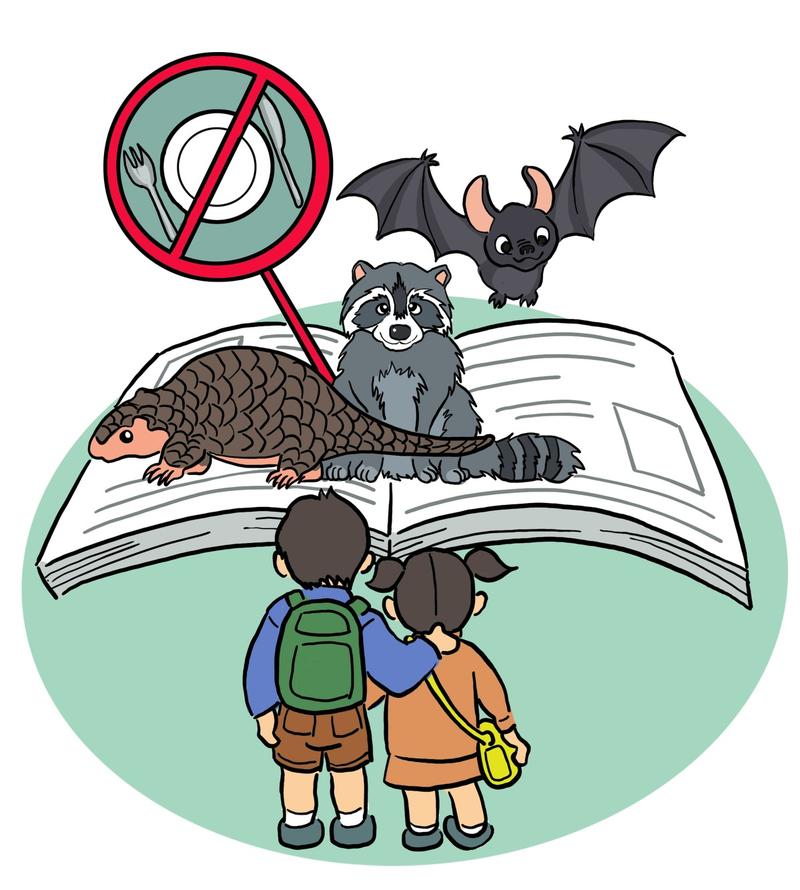 JIN DING/CHINA DAILY
JIN DING/CHINA DAILY
Joint efforts are being made to crack down on the illegal trade of wild animals as the country has more than 70,000 people infected with the novel coronavirus that is believed to have started in a wildlife market in Hubei province.
A special joint task force targeting the illegal wild animal trade was announced recently by five departments-the National Forestry and Grassland Administration, the General Administration of Customs, the Ministry of Public Security, the State Administration for Market Regulation and the Ministry of Agriculture and Rural Affairs.
Sites used to breed wild animals will be placed under strict isolation, and nearby warning signs are now required, according to an announcement by the five departments released on Friday.
Sites used to breed wild animals will be placed under strict isolation, and nearby warning signs are now required, according to an announcement by the five departments released on Friday
Furthermore, trade or transportation of wild animals and related products are prohibited in both brick and mortar stores and e-commerce platforms. Exceptions are only made for fished aquatic products.
READ MORE: Couple leaves their 2 children behind to serve on front line
The announcement said any store that breaks the law will be closed, and anybody illegally trading or transporting wild animals will receive heavier punishment.
"Departments at all levels should cooperate to crack down on the illegal wildlife trade and make full use of the public reporting platform. The public should be notified of those major or typical cases in a timely manner," said the announcement.
China's illegal wildlife trade has been thrust into the spotlight since the outbreak of the novel coronavirus, which has killed 1,770 on the Chinese mainland as of Sunday midnight, according to the National Health Commission.
The first cases of infection were traced to a market in Wuhan, capital of Hubei. The market is reported to have sold meat from a wide range of unusual wild animals, including camels, kangaroos, masked palm civets and the Chinese porcupine.
Since the outbreak, China has imposed a temporary ban on the trade of all wild animals across the country. No wildlife can be transported or sold in any markets or online until the public health emergency is over, according to the ban issued on Jan 26.
ALSO READ: Wuhan starts three-day screening campaign
A hotline, 12315, was opened for people to report violations.
Starting Feb 10, forestry departments at all levels have been asked to give daily law enforcement reports to the National Forestry and Grassland Administration.
According to the administration, provinces including Jiangxi, Hunan, Henan and Sichuan have conducted enforcement with other local departments as of Saturday.
In Yunnan province, known as the country's wildlife kingdom, 2,351 wild animal farms have been temporarily closed to the public, and all administrative approvals related to wild animals have been suspended.
By Feb 11, the Yunnan forestry security department had handled 186 cases of illegal wild animal trading with 20 suspects being held and 1,405 live animals caught.
"We are deeply saddened by the loss of lives due to the coronavirus outbreak, and our thoughts are with the families who have lost loved ones, or who are sick. We support China's decision to suspend all wildlife trading and check all wildlife breeding and utilization permits," said Zhou Fei, chief program officer of World Wildlife Fund for Nature China Office.
"This outbreak will serve as a wake-up call to anyone who eats wild animals. The intense fear of the outbreak helped change their outdated and mistaken perceptions. Wild animals are not food for humans," he said.


